Learn more about The Netherlands
Priorities
- Support (financially) businesses, local authorities and multi stakeholder approach through FBK, ACCEL, WNCB
- Support and raise awareness through activities and campaigns among businesses to child labour and forced labour in their supply chains.
- Share practical tips/suggestions and innovative solutions to upscale efforts
- Develop and implement voluntary and non-voluntary instruments by the government
- Develop and implement plans involved to activate and support businesses and other stakeholders to tackle child labour and forced labour in their supply chains.
- Prevent and combat labour exploitation as a result of labour migration at national level.
- Keeping the efforts to combat child labour in supply chains on the agenda, nationally and internationally
- Link eradication of child labour to root causes, living wage / income and quality education
- Stimulate (multistakeholder) dialogue on the elimination of child labour among different target groups and within broader themes such as decent work and RBC
- Contribute to an effective monitoring system worldwide in the context of Alliance 8.7
- Share challenges and opportunities via (interim) evaluations and results, and good practices of our programmes
- Support the execution of targeted research on child labour
Progress
- The Worldwide Netherlands Child Labour Platform (WNCB) achieved reduction in child labour and increased school attendance through an area-based approach. Main partners: WNCB, government authorities, and companies.
- The Federation of Dutch Trade Unions (FNV) Established Child Labour Free Zones and facilitated social dialogue in India's natural stone sector. Main partners: FNV, employers, and stakeholders in India.
- Support to the National Union of Education Workers, Mali (SNEC) lead to a formalized social dialogue through the creation of "spaces for social dialogue" involving various stakeholders. Main partners: SNEC, local authorities, education authorities, and others in Mali.
- The “Accelerating action for the elimination of child labour in supply chains in Africa (ACCEL Africa)” project funded by the Netherlands supported the tea industry in Uganda, resulting in increased wages and improved maternity leave. Main partners: Government of Uganda, workers' organizations, employers' organizations, and ACCEL.
- The Ministry of Foreign Affairs launched the Responsible Business Conduct (RBC) support center, which is now operational and provides assistance in responsible business conduct; published the International Social Responsibility implementation agenda. The General Approach on the Corporate Sustainability Due Diligence Directive (CSDDD) was adopted by the European Council. Main partners: MFA, businesses, government bodies, and stakeholders in the Netherlands and the European Union.
- The revised National Action Plan on Business and Human Rights was published in September 2022; implementation is currently underway.
- Research on new forms of child labour: A report on new forms of child labour, including kidfluencers, was sent to parliament in April 2023. Regulations on child labour will be modernized and tightened based on the report's recommendations. The follow-up process is ongoing, and the new regulations will be presented to parliament in early 2024.
- Certification of temporary employment agencies: The government (Roemer Commission) is working on establishing a certification system for temporary employment agencies to protect migrant workers. The draft bill has been sent for legal advice and is expected to be presented to parliament in Q3 2023. The new system is anticipated to take effect no earlier than 2025. Additionally, the second yearly report on the position of migrant workers has been published.
- Revision of article 273f of the Criminal Law: The Dutch government continues its fight against human trafficking and labour exploitation. The process of modernizing the criminalization of human trafficking under section 273f of the Penal Code is underway, including consultation and legislative amendments. The penalties for trafficking in human beings have been increased through the amendment of the Guideline for Criminal Procedure in Human Trafficking.
International Instruments
| Zone | Ilo Instrument | État | Ratification date | CEACR comments |
|---|---|---|---|---|
| Child Labour | C138 Ratification of C138 - Minimum Age Convention (1973) |
In Force | 14 Sep 1976 | |
| Child Labour, Forced Labour, Human Trafficking, Modern Slavery | C182 Worst Forms of Child Labour Convention (1999) |
In Force | 14 Feb 2002 | |
| Child Labour, Modern Slavery | C029 Forced Labour Convention (1930) |
In Force | 31 Mar 1933 | |
| Forced Labour, Human Trafficking, Modern Slavery | P029 Protocol of 2014 to the Forced Labour Convention (1930) |
In Force | 08 Aug 2017 | |
| Forced Labour, Modern Slavery | C105 Abolition of Forced Labour Convention (1957) |
In Force | 18 Feb 1959 | |
| Child Labour, Forced Labour, Human Trafficking, Modern Slavery | C143 Migrant Workers (Supplementary Provisions) Convention (1975) |
|||
| Child Labour, Forced Labour, Human Trafficking, Modern Slavery | C181 Private Employment Agencies Convention (1997) |
In Force | 15 Sep 1999 | |
| Freedom of Association | C087 Freedom of Association and Protection of the Right to Organise Convention (1948) |
In Force | 07 Mar 1950 | |
| Freedom of Association | C098 Right to Organise and Collective Bargaining Convention (1949) |
In Force | 22 Dec 1993 | |
| Discrimination | C100 Equal Remuneration Convention (1951) |
In Force | 16 Jun 1971 | |
| Discrimination | C111 Discrimination (Employment and Occupation) Convention (1958) |
In Force | 15 Mar 1973 | |
| Occupational Safety and Health | C155 Occupational Safety and Health Convention (1981) |
In Force | 22 May 1991 | |
| Occupational Safety and Health | C187 Promotional Framework for Occupational Safety and Health Convention (2006) |
Not In Force | 04 Oct 2024 |
| Zone | UN Treaty | Signature date | Ratification date | État |
|---|---|---|---|---|
| Child Labour | IV-11 Convention on the Rights of the Child (1989) |
26 Jan 1990 | 6 Feb 1995 A | Acceptance |
| Child Labour | IV-11-c Optional Protocol to the Convention on the Rights of the Child on the sale of children, child prostitution and child pornography (2000) |
7 Sep 2000 | 23 Aug 2005 | |
| Forced Labour, Human Trafficking | PALERMO_PROTOCOL Protocol to Prevent, Suppress and Punish Trafficking in Persons, especially Women and Children, supplementing the United Nations Convention against Transnational Organized Crime (2000) |
12 Dec 2000 | 27 Jul 2005 A | Acceptance |
| Human Trafficking, Modern Slavery | XVIII-4 Ratification of the Supplementary Convention on the Abolition and of Slavery, the Slave Trade and Institutions and Practices Similar to Slavery (1956) |
7 Sep 1956 | 3 Dec 1957 |
Sources: ILO Normlex & UN Treaty Collection
RESOURCES
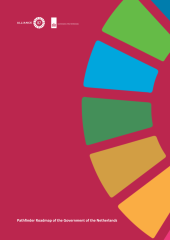
The Netherlands Roadmap
Document
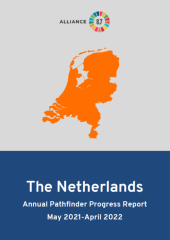
The Netherlands - Pathfinder Country Progress Report, 2021-2022
Document
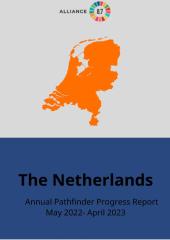
The Netherlands - Pathfinder Country Progress Report, 2022-2023
Document
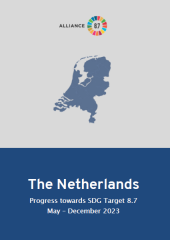
The Netherlands - Pathfinder Country Progress Report, May - December 2023
Document
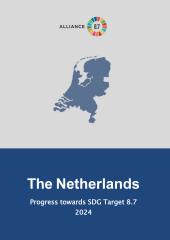
The Netherlands - Pathfinder Country Progress Report 2024
Document